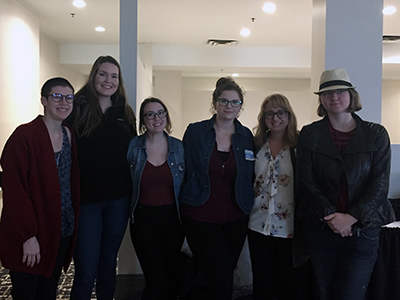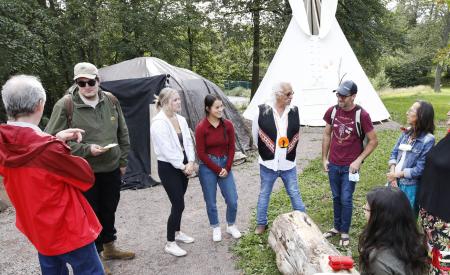Sociology students experience Gender Equality Workshop
 Many organizations are working towards gender equality in the workplace and they use a variety of policies to achieve this goal.
Many organizations are working towards gender equality in the workplace and they use a variety of policies to achieve this goal.
In Comparative Social Policy, a sociology class taught by Professor Christiana MacDougall, students examine and compare various policies and approaches to policies adopted in Canada and in Nordic and European countries.
As part of their class, they also had first-hand experience with how such policies are pursued by Correctional Service of Canada (CSC) when they participated in a Gender Equality Workshop hosted by the CSC.
MacDougall says important experiential learning occurs when students compare theories they have learned in class with outcomes that occur when those theories are put into practice.
“It is great to know all these theories, but a whole new level of learning occurs when students see what works and what doesn't when an organization tries to implement the theories. Individual organizations often have individual approaches to these problems,” MacDougall says.
For the first-ever Gender Equality Week — a new initiative launched in September by the federal government — the CSC invited Robyn Tingley, an internationally-recognized expert, to run a workshop. Tingley provided an overview of the basic structural issues that get in the way of gender-equality.
Following the overview, participants broke into smaller discussion groups where they considered various issues in greater detail. This also gave students the opportunity to discuss social issues with experienced professionals. For most students, this was their first professional workshop.
“I really enjoyed this event,” says sociology student Ellie Milbur. “I think it is wonderful that the government is paying attention to gender inequalities in the workplace and developing strategies to improve the situation.”
The students also found it meaningful to not only discuss policy, but hear about experiences of policy and policy changes in the workplace from the employees themselves.
“By participating in a discussion with working professionals, we gained insight into how the intention behind a policy can be dramatically different from how it turns out in reality,” says sociology student Victoria Reeves. “In witnessing a group of women and men acknowledge that the execution of a policy has failed to resolve important issues, and yet seeing them continue to work together to find improvements, we observed the extent to which people can become invested in creating change.”
Sociology student Janet Gourley says being a part of a discussion that may lead to policy changes was a very rewarding experience.
“We were constantly combining knowledge we've acquired as sociology students with the lived experiences of women in the workforce to propose ideas for change,” says Gourley.
MacDougall says the students were not the only ones to benefit from the experience; the staff from the CRC also appreciated the students’ contribution to the discussion.
“One of our students brought up the second shift, which is a term that describes women being expected to work all day and then come home and engage in labour at home. And lots of participants were nodding about this. Clearly this comment resonated with these women. So that was fun,” MacDougall says.
PHOTO CAPTION: Kate Robotham, Ellie Milburn, Janet Gourley, Hailey Hunt, Professor Christiana MacDougall, and Ocean Burgess.




